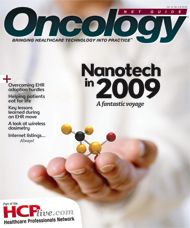Nanotech: Boom or Bust?
Can you imagine producing or manipulating something 1,000 times smaller than the width of a human hair?
Can you imagine producing or manipulating something 1,000 times smaller than the width of a human hair? Yet this is precisely what countless researchers across the world are doing to develop products and applications that may one day change how we live and how illnesses such as cancer are treated.
Currently, the nanomedicine sector of nanotech is dominated by the development of novel drug delivery mechanisms, such as the work on nanocapsules done by Russell Mumper, PhD, outlined in our “Nanotech in 2009: A Fantastic Voyage” article. This field, however, is rapidly evolving, and, according to Robert A. Freitas, Jr., author of Nanomedicine, a four-volume book series, “Basic nanostructured materials, engineered enzymes, and the many products of biotechnology will be enormously useful in near-term medical applications. However, the full promise of nanomedicine is unlikely to arrive until after the development of precisely controlled or programmable medical nanomachines and nanorobots.” Is anyone working on developing these nanobots that one day may be able to hunt down rogue cells and destroy or repair them before they result in a chronic or life-threatening illness? You bet! Countless institutions are looking to gain a slice of that pie, and a huge nanotech boom across all market sectors is anticipated over the next six to seven years. According to Lux Research, a technology advisory firm, nanotechnology-based products are anticipated to reach a market share of up to $3.1 trillion by 2015.
Some have attributed the coming boom to the fact that nanotech research is not being stifled by government regulation. This freedom has caused considerable concern among some consumer advocacy groups, as the ramifications of consuming or using nanomaterials is not yet fully understood, and these materials have already made it into over-the-counter supplements and numerous other consumer products. It appears that measures are slowly being taken to regulate nanotech, but even if this happens, there is no denying that nanotech could very well represent the next industrial revolution.
Thank you.
Mike Hennessy
